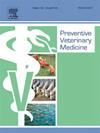农民的知识至关重要:提高对尼日利亚北部小反刍兽疫的流行病学认识
IF 2.4
2区 农林科学
Q1 VETERINARY SCIENCES
引用次数: 0
摘要
小反刍兽疫是尼日利亚绵羊和山羊的一种地方病,对小农的生计构成重大威胁。了解该病的流行病学和畜牧农民对该病的管理对于制定适当的监测和控制规划至关重要。本研究旨在通过在尼日利亚北部高原州、包奇州和卡诺州的52个村庄进行大规模调查,提高对小反刍兽疫的认识。我们的方法包括与男女农民举行焦点小组讨论,收集他们对该病的知识,了解他们对该病管理的看法。结果表明,农民使用几个不同的术语来指代可能是小反刍兽疫的疾病,这些术语也可能用于指代由其他传染性病原体引起的疾病。农民很少要求兽医服务来预防疾病,也很少接种疫苗。在有或没有兽医监督的情况下,或使用传统疗法,尝试使用常规疗法控制疾病。诸如生物安全措施等良好农业实践的实施有限或很差。这项研究增加了我们对小反刍兽疫及其在公共和私人兽医服务有限地区管理的认识。此外,它还促进了科学家和社区之间的信任,为未来的参与性行动研究项目铺平了道路。本文章由计算机程序翻译,如有差异,请以英文原文为准。
When farmers’ knowledge matters: Improving epidemiological understanding of Peste des petits ruminants in northern Nigeria
Peste des petits ruminants (PPR) is an endemic disease of sheep and goats in Nigeria and represents a major threat to the livelihoods of smallholders. Understanding the epidemiology of this disease and its management by livestock farmers is essential for developing appropriate surveillance and control programmes. This study aimed to enhance the knowledge about PPR by conducting a large-scale survey in 52 villages in Plateau, Bauchi and Kano states in the northern part of Nigeria. Our approach involved holding focus group discussions with farmers, both men and women, to collect their knowledge about the disease and to understand their perspectives on its management. The results showed that farmers use several different terms to refer to diseases that are likely to be PPR, and that these same terms might also be used to refer to diseases caused by other infectious agents. Farmers rarely call on veterinary services to prevent the disease and vaccination is seldom practiced. Disease control is attempted using conventional treatments, with or without veterinary supervision, or using traditional therapies. There is limited or poor implementation of good farming practices such as biosecurity measures. This study has increased our understanding of PPR and its management in areas with limited public and private veterinary services. In addition, it has also fostered trust between scientists and communities, paving the way for future participatory action research programmes.
求助全文
通过发布文献求助,成功后即可免费获取论文全文。
去求助
来源期刊

Preventive veterinary medicine
农林科学-兽医学
CiteScore
5.60
自引率
7.70%
发文量
184
审稿时长
3 months
期刊介绍:
Preventive Veterinary Medicine is one of the leading international resources for scientific reports on animal health programs and preventive veterinary medicine. The journal follows the guidelines for standardizing and strengthening the reporting of biomedical research which are available from the CONSORT, MOOSE, PRISMA, REFLECT, STARD, and STROBE statements. The journal focuses on:
Epidemiology of health events relevant to domestic and wild animals;
Economic impacts of epidemic and endemic animal and zoonotic diseases;
Latest methods and approaches in veterinary epidemiology;
Disease and infection control or eradication measures;
The "One Health" concept and the relationships between veterinary medicine, human health, animal-production systems, and the environment;
Development of new techniques in surveillance systems and diagnosis;
Evaluation and control of diseases in animal populations.
 求助内容:
求助内容: 应助结果提醒方式:
应助结果提醒方式:


